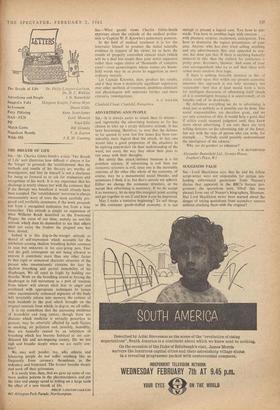SIR,—It is always easier to attack than to defend— and
regrettably the advertising business so far has chosen to take up a pretty defensive attitude. It has been heartening, therefore, to note that the defence so far quoted in your last few issues has been con- siderably more logical than the attack. In fact one would take a good proportion of the attackers to be aspiring copywriters (in their understanding of the word, not ours), the way they allow their pens to run away with their thoughts.
But surely this attack/defence business is a bit• pointless anyway. If advertising is evil then our economic structure is evil, since one is the inevitable outcome of the other (the whole of the economy, of course, may be a monumental social blunder. and sometimes I think it is; but that's outside my sphere). Either we change the economic structure, or we accept that advertising is necessary. If we do accept it as necessary, let us stop this marginal point scoring and get together to see if and how it can be improved.
May I make a tentative beginning? To sell things in this consumer goods-stuffed economy, it is not enough to present a logical case. You have to per- suade. You have to combine logic with emotion . . . with pleasure, surprise, excitement, anticipation. You have to dramatise the logical presentation of your case. Anyone who has ever tried selling anything and any advertisement that ever appealed to any- one, has done just that. If there is anything basically immoral in this, then the outlook for politicians is pretty poor. Barristers, likewise. And some of your own correspondents who try to sell their ideas with rather more emotion than logic.
If there is nothing basically immoral in this--if critics could agree that within our present economic structure this approach is not only necessary but reasonable--then that at least would form a basis for intelligent discussion of advertising itself (much of it is unintelligent because it is uninformed); of its benefits and of its drawbacks.
By definition everything we do in advertising is done just as publicly as it possibly can be done. Our social responsibilities are therefore great, and we arc very conscious of this. It would help a great deal if critics could suspend judgment until they knew more about advertising. I am sure there are very willing debaters on the advertising side of the fence, but not with the type of person who can write, for example . . . 'Nobody could possibly underestimate the intelligence of the admass.'
Why are do-gooders so inhuman?
J. H. BUTTERFIELD
Alexander Butterfield Ltd., Gemini House, Foubert's Place, WI


































 Previous page
Previous page